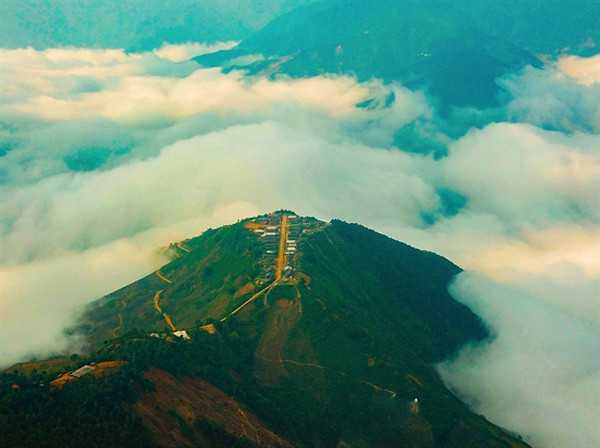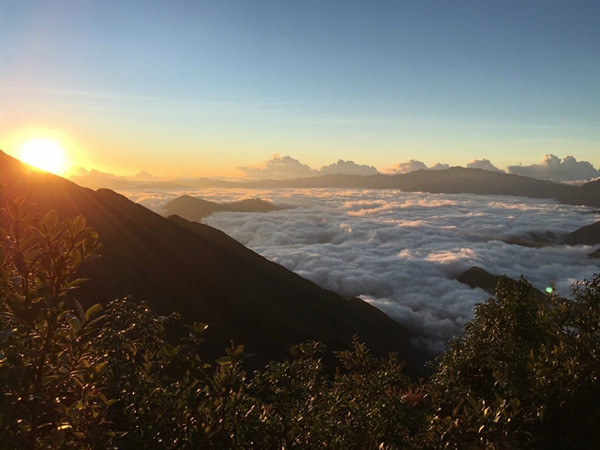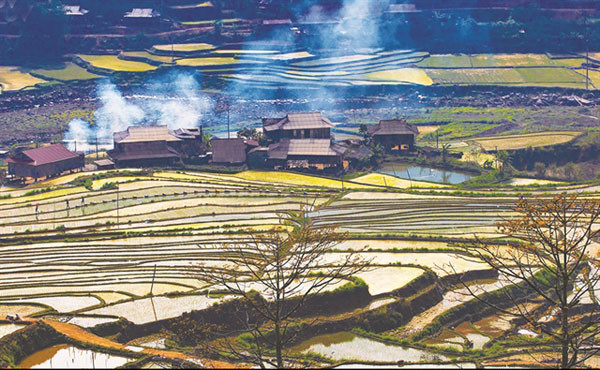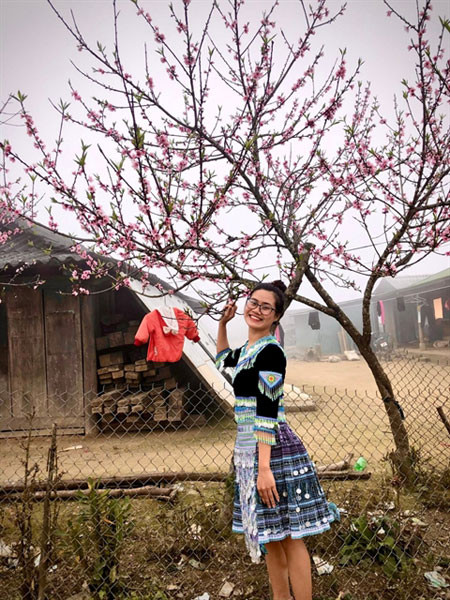
Lying on the middle of the slope, Cu Vai Village, Xa Ho Commune, Tram Tau District, Yen Bai Province appears like a magical, fairy tale place in the mountains of the northwest.
The village, which is about 250km from the centre of Hanoi, is located at an altitude of 1,000m above sea level on the top of a distant mountain, covered with clouds all year round.
In Thai language, Cu Vai means a strip of clouds stretching across the sky. The road to the village is still difficult, from the centre of the district to the village is about 20km, however, it is quite hard with small rough trails and big rocks. The slopes twist continuously along the mountainside, challenging any rider's skills.
After the arduous journey, the reward for us is to witness the white clouds floating around the village, the red trails zigzagging on the hillsides. The terraced fields are layered, the fresh air fascinates us.
Viewed from above, the village looks like an airport on the top of the mountain, surrounded by green trees and hills. The road that divides the village is the runway, the houses alternate on both sides like navigators to direct aircrafts.
Cu Vai is covered with clouds all year round and surrounded by mountains and forests, so the daily life and culture of the locals are also separate from the noisy world.
In the village, there are mainly small houses built in the style of the Mong people. Connecting between the wooden houses is a flat road about 5m wide that runs through the village. In front of each house Are peach trees with green leaves and brilliant flowers.

We walked on the main road of the village, seeing children playing, admiring the flowers and listening to the sounds coming from the surrounding mountains and forests, making our souls peaceful.
Coming to Cu Vai, we felt like we were lost in a fairy tale village with strangely real beauties.
The village was only established in 2013, which was a resettlement place for the Mong people to move out of the areas at high risk of landslides.
After nine years the whole village has more than 50 households and has had electricity since 2017 thanks to the programme "Bringing electricity to the village" by Miss Vietnam Do My Linh.
A kindergarten has been built with full teaching and learning equipment. Students in primary, secondary and high school are allowed to study in communes and districts with the full support of the State.
In the past, the people only worked in rice fields, now with the support of leaders of district, the Mong people learned how to increase production, grow maize, plant fruit trees and raise cattle and poultry.
We came the village in autumn when golden "rice waves" are seen on terraced fields. But if you visit in spring, you will be able to see peach and plum blossoms all over the village and in winter you can catch snow.

There are not any motels or homestays in the village yet, so our best choice was to visit in the morning to exchange and learn about the life of the Mong people and return in the early afternoon because of the mountainous road is quite dangerous.
However, if you want to stay, you can ask villagers to put you up or camp overnight. The weather in the mountainous areas is quite hard so to visit the village, you should bring a jacket, raincoat, lighter, flashlight, water and food.

Our group returned to Tram Tau Town in the afternoon and chose to stay at a homestay in Zone 5.
Nestled in the middle of vast fields, this homestay brought us a fresh atmosphere and peaceful village scene. There is a hot spring flowing from the ground here, so the water is very clear, clean and very beneficial to your health.
Immerse ourselves in warm water, we reminisced about our trip to Cu Vai. We were able to be quiet in the midst of the hustle and bustle of life, to return to our true self, to see a new colour of life. Nice! So poetic! But there were still many difficulties and hardships of the lives of ethnic minorities, so we could see that tourism is not simply about enjoying and seeing, but tourism is about giving us the experience to understand and love people and places in the country more.
Source: Vietnam News